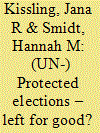| Srl | Item |
| 1 |
ID:
192950


|
|
|
|
|
| Summary/Abstract |
How does the phased withdrawal of United Nations peacekeeping operations (PKOs) influence electoral violence? Many PKOs recently ended and peacekeeping personnel numbers are decreasing. Yet, research on peacekeepers’ exit remains in its infancy. We help fill this lacuna and examine how peacekeepers’ withdrawal affects violence during electoral periods. We focus on electoral periods because elections are both often-desired intervention endpoints and violence-prone moments in post-war trajectories. We argue that electoral violence increases shortly after a reduction in PKO troops because shortfalls in external oversight and security assistance reduce costs for organizing violence and open opportunities for pursuing a coercive electoral strategy. However, violence-inducing exit effects are likely short-lived due to adaptation by domestic security forces or peacekeepers who remain in the host country. We examine our argument across electoral periods and first-order administrative units of all African countries hosting a PKO (2001–2017). Controlling for violence trends prior to peacekeepers’ exit, two-way fixed effects models suggest that a local reduction in PKO troops is not associated with subsequent increases in electoral violence. However, withdrawal incidents lead to spikes in political violence more broadly defined. Our results confirm worries that downsizing during election times may endanger security gains in post-war countries.
|
|
|
|
|
|
|
|
|
|
|
|
|
|
|
|
| 2 |
ID:
192952


|
|
|
|
|
| Summary/Abstract |
How do United Nations (UN) peacekeeping missions influence the use of conflict related sexual violence (CRSV) by armed non-state actors? This study argues efficacy is influenced by conditions that precede deployment and the composition of UN forces. Poor intragroup cohesion within rebel ranks incentivizes CRSV, putting peacekeepers in a precarious position upon deployment. UN police improve law enforcement capabilities, build relationships with local communities, and promote information diffusion mechanisms. As a result, UN police are associated with a decrease in CRSV, even in the most difficult environments.
|
|
|
|
|
|
|
|
|
|
|
|
|
|
|
|
| 3 |
ID:
192951


|
|
|
|
|
| Summary/Abstract |
On 23 June 2021, after months of deliberations, the Southern African Development Community (SADC) approved the establishment of the SADC Mission in Mozambique (SAMIM) in response to escalating violent extremism and insurgency by an Islamist armed group, Al-Shabaab or Al-Sunnah wa Jama’ah (ASWJ), in Mozambique’s northern Cabo Delgado province, which posed the risk of regional contagion. SAMIM was deployed under scenario 6 of the African Standby Force (ASF) with a mandate focused on supporting the Mozambican government to combat terrorism and violent extremism in Cabo Delgado. Its mandate also centred on strengthening and maintaining peace and security; restoring law and order; and assisting the government and humanitarian agencies to provide humanitarian relief to the affected population. This paper contributes to raising public understanding of the regional and continental policies and principles underpinning the SADC decision-making process regarding the deployment of peace missions and the effectiveness of SAMIM in fulfilling its mandated tasks until its first anniversary. It identified the relative pacification of Cabo Delgado as a crucial strategic and operational impact of SAMIM’s exceptional military intervention, which facilitated its segue into a multidimensional peacebuilding mission. Six principal constraints-cum-opportunities of SAMIM, which had a significant bearing on its effectiveness, are discussed.
|
|
|
|
|
|
|
|
|
|
|
|
|
|
|
|